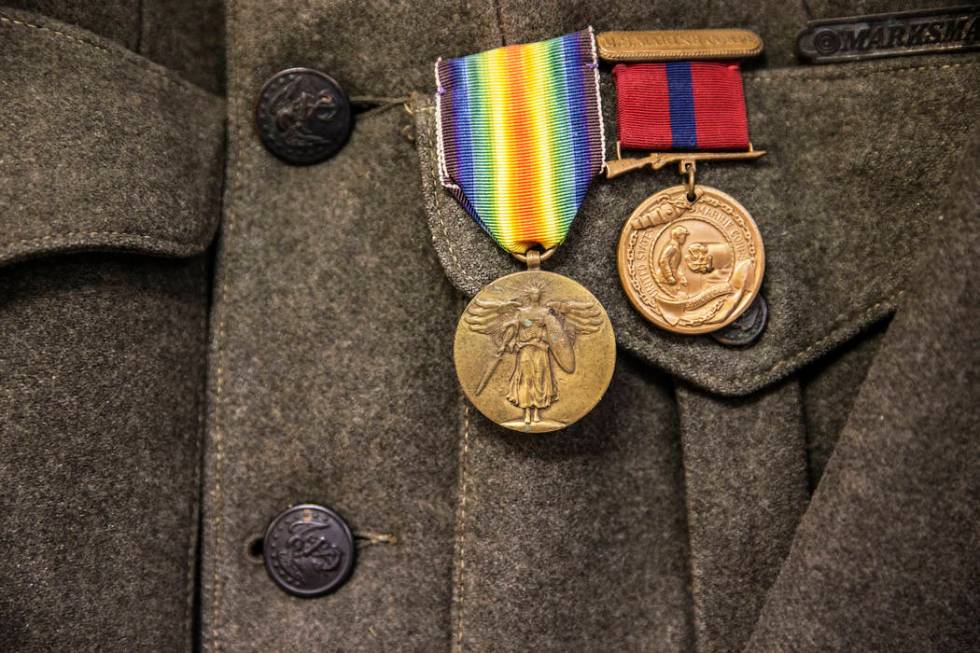A century after World War I, Las Vegas hosts a remembrance

Pvt. Kilmer S. Bagley “hated the damn war but he loved the Marines.”
And like all Marines, says his daughter, he wanted to make a difference.
Bagley’s story, the subject of a permanent exhibit at the Leatherneck Club bar and grill in Las Vegas, is perhaps the most poignant local relic of World War I available for viewing on the 100th anniversary of the U.S. declaration of war on Germany on April 6, 1917.
The “Letters from a Marine” display uses Bagley’s own words and those of his father to tell the story of the young Minnesotan’s enlistment in the Marines and subsequent battlefield experiences in France.
Bagley was a high school senior in Duluth, Minnesota, in 1915 when German U-boats torpedoed the British ocean liner RMS Lusitania, killing 1,198 passengers and crew, including 128 Americans.
“It’s a shame we don’t help,” he told his dad, physician William Bagley, at the time.
‘Unfit for service’
The younger Bagley decided to do something himself, dropping out of high school soon afterward and trying to enlist in the Canadian military, which had declared war on Germany in 1914. He was rejected as “unfit for service,” his father wrote.
He returned to Duluth and finished high school, then enrolled at the University of Michigan before dropping out again and joining the Marines. And not just any unit, but the storied 5th Regiment, 2nd Marine Division led by Maj. Gen. John A. Lejeune.
Bagley traveled with the regiment to France, writing frequently to his loved ones back home. His letters from the battlefront simultaneously convey fear, loneliness and bravery:
Aug. 8, 1918
Dear Father and Mother:
I am well and near the front. I am the only one of the Company from Paris Island in this regiment so I feel quite alone.
I am now joined with the famous old Marines who started this drive against the Germans. … I have had my first experience with cooties already. I will have to stop as we marched most of last night and may march tonight, so I need some sleep.
With love, your son,
Kilmer
Bagley fulfilled his desire to make a difference.
He later wrote that he went “over the top” of the front line trenches in four major battles — at Saint-Mihiel, Champagne, Feloc and in the Meuse-Argonne Offensive. In fighting in Champagne, he destroyed two German machine gun nests and was awarded the esteemed French Croix de Guerre medal.
Despite the near constant danger and horrific conditions, Bagley remained upbeat in his letters home.
“I hope the flu hasn’t hit you people as hard as it has the Army,” he wrote two weeks after the armistice on Nov. 11, 1918.
Gassed during fighting
It was only on Christmas Eve, in a letter sent from “Across the Rhine,” that he hinted that his health was not good.
“I got my usual cold this year and am now in bed in a field hospital,” he wrote. “… The doctor calls it laryngitis because I can’t talk.”
The cold was actually the after-effects of being gassed during the assault on Blanc Mont Ridge in early October, when the 2nd Division fought with the 4th French Army to recapture the high point of the rolling Champagne terrain.
Bagley arrived in New York aboard the ship, Leviathan, with American Expeditionary Forces commander Gen. John J. Pershing on Sept. 9, 1919, and eventually returned to Minnesota. But his health never fully recovered. He died on Jan. 4, 1948, at 47, a delayed victim of chemical warfare.
“They figured he was gassed during the war. His lungs were never good after that,” said Jessie Greene, 90, who was 21 when her dad died.
“I’m in a crying mood thinking about my father,” she said by phone last week from Hickory, North Carolina. “He was perfect in every way. He died too early.”
“Letters of a Marine,” compiled by Bagley’s mother, Marian, includes notes and a heart-wrenching epilogue written as a letter from William Bagley to his son.
‘It isn’t possible!’
“I saw you die. It isn’t possible!” he wrote on Jan. 9, 1948. “You came home, married — have four fine children and established yourself successfully in the business world with wide respect of your Fellows.
“Now you have left us, and we are to be lonesome for you until we have fought the good fight and are taken to our reward.”
Bagley’s items were donated to the Leatherneck Club as a tribute to his service by his granddaughter, Susan Delaney , a Navy veteran, and her husband, Bill Delaney, who have lived in Las Vegas for 23 years. Like Bagley, Bill Delaney served in the storied “Warrior” patch 2nd Marines.
Having the items on public display “speaks to what we think of this country. It continues the legacy,” Susan Delaney said.
Added Bill: “He was very patriotic. He was willing to die and he did die for this country. To me he was a hero then and he’s a hero now.”
The war memorabilia museum at the Leatherneck Club, 4360 W. Spring Mountain Road, is free and open to the public every day from 11 a.m. to 11 p.m.
Contact Keith Rogers at krogers@reviewjournal.com or 702-383-0308. Follow @KeithRogers2 on Twitter.